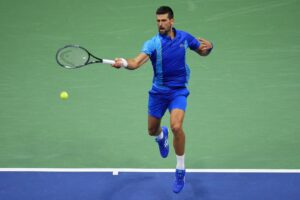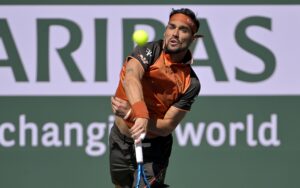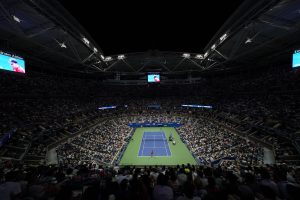The men’s event at Indian Wells was established far earlier than the women’s – in 1974, as opposed to 1989 – so there are far more men’s finals than women’s finals to choose a top five from. Nevertheless, just like the women’s event, the men’s event has altered in form and format over the decades. For its first decade, it was comprised of three-set matches; then it switched to five-set matches for the next decade or so; and finally, from 2008 onwards, it switched back, like all Masters events, to three-set matches. However, whether they were played out over three or five sets, these are the five finest Indian Wells Men’s Finals, set out in chronological order, which the 2021 final this weekend will have to go some to match.
- 1994: Pete Sampras defeats Petr Korda 4–6, 6–3, 3–6, 6–3, 6–2
Sebastian Korda, son of Petr, has often joked that his main ambition in tennis is to win two Majors – one more than his father, who won the 1998 Australian Open – so that he can permanently have bragging rights at family events. Of course, both men could ultimately be beaten, albeit in another sport, by Nelly Korda, Petr’s daughter and Sebastian’s sister, who has already won one of golf’s Majors (the 2021 Women’s PGA Championship), as well as winning Olympic Gold in Tokyo and reaching World No.1. Clearly, the Kordas are an extraordinary sporting family.
Petr Korda’s hey-day was in the 1990s, when he reached No.2 in the world in February 1998, shortly after winning the Australian Open, and he also reached another Major final earlier in the decade, at the 1992 French Open, which he lost in straight sets to Jim Courier. However, the undisputed World No.1 in men’s tennis for most of the 1990s was, of course, another American, Pete Sampras, who was arguably right in the middle of his truly imperial phase when he faced Korda in the 1994 Indian Wells final. It is a testament to Korda’s ability on all surfaces that he could take “Pistol Pete” all the way to five sets in that final, but as was usually the case in the 1990s Sampras ultimately triumphed, fighting back from two sets to one down to finally win in five.
- 2011: Novak Djokovic defeats Rafael Nadal 4–6, 6–3, 6–2
When Novak Djokovic lost to Daniil Medvedev in the US Open final in September, he not only failed to win the Calendar Grand Slam, which was last achieved in men’s tennis more than half a century ago (by Rod Laver in 1969); he also failed to round off in spectacular style the most remarkable decade that any male tennis player has ever enjoyed. Even so, having won 19 of his 20 Majors in the ten years between 2011 and 2021 (it took both Roger Federer and Rafael Nadal 15 years to win their 20 Majors), there is no doubt that Djokovic was the dominant (or “djominant”) force in men’s tennis in the second decade of the 21st century.
NADAL v DJOKOVIC | 2011 INDIAN WELLS FINAL | ATP – YouTube
That golden age for Djokovic began, of course, in 2011, soon after the diagnosis of his gluten intolerance and his leading Serbia to a first ever Davis Cup triumph, and he maintained that momentum first by winning the Australian Open that year (having first won it in 2008) and then by winning virtually everything else at the start of the season. That included triumphing in the Indian Wells final over Nadal, when he came back from losing the first set to virtually steamroller the great Spaniard in the next two sets. In fact, Djokovic’s remarkable start to that season, and what would prove to be an entire decade of astonishing success (a few mid-decade wobbles notwithstanding), only came to an end in the French Open semi-final in May, when Roger Federer achieved one of his finest ever results in Paris by defeating him in four sets.
- 2014: Novak Djokovic defeats Roger Federer 3–6, 6–3, 7–6 (7–3)
By 2014, so almost halfway through the “teenies” (2010-20), Djokovic had long since proved that his spectacular start to the decade was not a fluke. Instead, he had definitively risen above both Federer and Nadal to become the undisputed World No.1 in men’s tennis. And his victory over Federer in that year’s Indian Wells final was further proof of that.
Classic Tennis Highlights: Roger Federer v Novak Djokovic | Indian Wells 2014 – YouTube
Federer won the first set with a single break of serve, but Djokovic repeated that feat in the second set to level the match. The third set was extremely close, with Djokovic breaking early and then retaining his serve to go 5-4 up and serve for the match. Federer, however, duly broke back and the match went to a deciding tie-break, which Djokovic eventually won 7-3. Unfortunately for Federer, this would set the tone for almost all of his subsequent matches against Djokovic in the rest of the decade, notably at Wimbledon, where he would lose three classic finals to Djokovic in 2014, 2015 and 2019. In the last one, of course, he actually held two match-points but still could not triumph.
- 2018: Juan Martin del Potro defeats Roger Federer 6–4, 6–7 (8–10), 7–6 (7–2)
It was not just against Novak Djokovic that Roger Federer lost agonisingly close Indian Wells finals. At the end of the last decade, he would go on to lose two more hard-fought three-set finals in California, one of them in another tie-break, although he did have the consolation of winning the 2017 Indian Wells final against his compatriot Stan Wawrinka, when he was in the middle of what may well prove to be his own last imperial phase.
Del Potro wins breathtaking final against Federer! | Indian Wells 2018 Final Highlights – YouTube
In 2018, Federer was defeated in the Indian Wells final by Juan Martin del Potro, the giant Argentine who had first burst onto the Major scene nearly a decade earlier in 2009. Then, he had denied Federer a sixth successive US Open title, when he defeated him in the final in New York in five sets. By 2018, of course, Indian Wells, like every Masters event, was only played out over three sets, so it obviously could not replicate the epic intensity of a five-set Major final. Nevertheless, it came as close to matching it as any three-set final could, especially as the final two sets were only decided by tie-breaks. Del Potro lost the first but won the second, to record arguably his greatest triumph since that lone Major win in 2009.
- 2019: Dominic Thiem defeats Roger Federer 3–6, 6–3, 7–5
Roger Federer made it a completely unwanted hat-trick of defeats in Indian Wells finals in five years when he surprisingly lost to Dominic Thiem in 2019. Of course, that was the last time that the Indian Wells event was staged until now, after its cancellation last year and its relocation to the fall/autumn this year, both of which were caused by the Coronavirus pandemic.
Highlights: Thiem Topples Federer For Maiden Masters Title In Indian Wells 2019 – YouTube
The reason that Thiem’s victory was so surprising was that up until that point he had been considered a clay-court specialist, having reached the 2018 French Open final (a feat he would repeat in 2019). Beating Federer on the hardcourt of Indian Wells proved to everyone, including Thiem himself, that he could translate his superb clay-court form to other surfaces. He proved that again in 2020, first reaching the Australian Open final, where he took a two sets to one lead against Novak Djokovic before eventually losing in five sets, and then winning the US Open, when he came back from two sets down against Alexander Zverev to win the title in a fifth-set tie-break. That maiden Major triumph, on a hardcourt, had first seemed feasible 18 months earlier when he defeated Federer in the Indian Wells final.
Main Photo:





